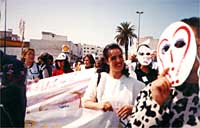The event represented indirect support for the Plan to Integrate Women in Development, put forward by the Secretariat of State for Social Protection. The plan advocates improvement of Moroccan women's situation in various fields (education, health, employment). It also recommends reforming the civil status code so that men would cease having absolute authority over their wives. Divorce would no longer be decided solely on the basis of the husband's willingness, the age of marriage would be raised, and polygamy would be outlawed.
The prime minister endorsed the plan in 1999, but conservative Muslim circles were opposed and organized a counter-demonstration in Casablanca on March 12, 2000.
The debate continued in March 2001. Women's rights activists managed to convince King Mohammed VI to appoint a new Royal Commission to examine a reform of the civil status code. Opposition was still very strong though, and the reform was not making much headway.
Lebanon is the scene of a similar debate since each religious community applies its own codes, laws, and rules. Muslims (both Sunnites and Shiites), Catholics, Druzes, Maronites, Orthodox Greeks and Syrians, Orthodox Armenians and Jews are all governed by different codes.
The women participating in the March continued a fight taken up several years before demanding the introduction of a civil code separate from the religious codes for matters such as marriage and divorce. "We refuse to be second-class citizens," a Lebanese activist declared.
The women's demonstration on September 24, 2000 in Beirut also provoked opposition from religious leaders who forbade everyone from taking part. Nonetheless, 3000 women and men came out, and delegations from neighbouring countries (Egypt, Jordan, Palestine), Tunisia and Morocco were also there.
In 2001, the fight for this reform continued.





